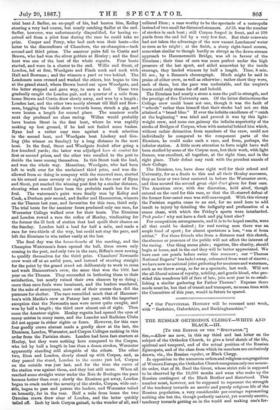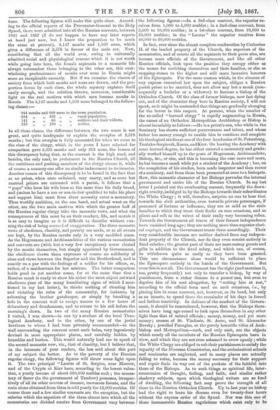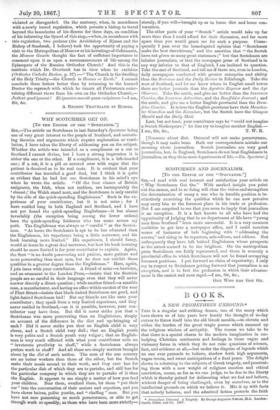THE RUSSIAN ORTHODOX CLERGY—WHITE AND [To THE EDITOR OF THE
"SPECTATOR."]
Sm.,—Allow me now, in this my third and last letter on the subject of the Orthodox Church, to give a brief sketch of the life, spiritual and temporal, and of the actual position of the Russian Episcopate, and of the class from which its members are exclusively drawn, viz., the Russian regular, or Black Clergy.
In opposition to the numerous orders and religious congregations of Western Europe,the Orthodox Church recognizes onlyone monas- tic order, that of St. Basil the Great, whose strict rule is supposed to be observed by the 10,000 monks and nuns who make up the Russian contingent of the Black Brother and Sisterhood. This number must, however, not be supposed to represent the strength of the tendency towards an ascetic and purely religious life of the Russian population, a very considerable per-centage representing nothing else but the, though perfectly natural, yet scarcely ascetic, tendency towards getting on in the world and making one's for-
tune. The following figures will make this quite clear.. Accord- ing to the official reports of the Procurator-General to the Holy Synod, there were admitted into all the Russian convents, between 1841 and 1857 (I do not happen to have any later reports at hand just now, but I know the proportion to be much the same at present), 4,147 monks and 1,569 nuns, which gives a difference of 2,578 in favour of the male sex. Now, considering that all the world over, owing to universally admitted social and physiological reasons which it is not worth while going into here, the female aspirants to a monastic life always outnumber those belonging to the other sex, this over- whelming predominance of monks over nuns in Russia might seem an inexplicable anomaly. But if we examine the classes of society from which both monks and nuns are drawn, and the pro- portion borne by each class, the whole mystery explains itself easily enough, and the solution throws, moreover, considerable light on the real motives with which men become monks in Russia. The 4,147 monks and 1,569 nuns belonged to the follow- ing classes :—
944 monks and 608 nuns to the town population. 684 „ „ 492 „ „ rural population.
141 „ „ 66 „ „ soldiers and their widows. 125 „ „ 190 „ „ nobles.
In all these classes the difference between the two sexes is not great, and quite inadequate to explain the overplus of 2,578 monks ; but this overplus is fully accounted for when we come to the class of the clergy, which in the years I have selected for comparison gave 2,253 monks and only 213 nuns, the 'reason of this discrepancy being that, as the convent is the high road, and besides, the only road, to preferment in the Russian Church, all the ambitious and pushing members of the clergy choose it, while of course a nunnery can offer no similar inducement to its inmates. Another reason of this discrepancy is to be found in the fact that as no priest, when once ordained, may marry, and as none but married priests are entrusted with a parish, it follows that a "pope" who loses his wife loses at the same time his daily bread, and (unless he have a son or son-in-law qualified to take his place and support him) must from sheer necessity enter a monastery. Thus worldly ambition, on the one hand, and actual want on the other, are the two main motives with which the greater half of the Russian regular clergy take the monastic vows, and what the consequences of this must be on their conduct, life, and morals it is as easy to imagine as it is difficult to describe without run- ning the risk of being accused of exaggeration. The three monastic vows of obedience, chastity, and poverty are made, or at all events
are kept, by the Russian monks only in a very modified sense. As the Hegoumens and .Archimandrites of the various monasteries and convents are (with but a very few exceptions) never elected by the monks themselves, but simply appointed by Government, the obedience shown them expresses of course no solidarity of
aims and views between the Superior and the Brotherhood, and is exactly on a par with the feelings of a soldier for his officer, or, rather, of a maidservant for her mistress. The latter comparison holds good in yet another sense, for at the same time that a Russian monk is ready to show his abbot the most abject outward obedience (one of the many humiliating signs of which I men- tioned in my last letter), he thinks nothing of cheating him and violating the rules of the community, for instance, by suborning the brother gatekeeper, or simply by breaking a hole in the convent wall to escape unseen to a few hours of debauchery and drunkenness, and to return to his cell before the morning's dawn. In two of the many Russian monasteries I visited, I was shown—in one by a student of the local Theo- logical Academy, and in the other, by one of the jovial brethren to whom I had been privately recommended—in the wall surrounding the convent court such holes, very ingeniously devised in most appropriate places, and carefully hidden by brambles and bushes. This would naturally lead me to speak of the second monastic vow, viz., that of chastity, but I believe that, in the interests of your readers, the less said about this part of my subject the better. As to the poverty of the Russian regular clergy, the following figures will throw some light upon
it. The two principal " Lauras of St. Sergins, near Moscow, and of the Crypts at Kiev have, according to the lowest valua- tion, a yearly income of about 500,000 roubles each ; the monas- tery of Saro. v (in the government of Tambov) possesses, irrespec- tively of all its other sources of income, enormous forests, and the resin alone obtained from them is sold yearly for 12,000 roubles. Of course these and a few similar convents are the exception, but the salaries which the superiors of the three classes into which all the monasteries are divided receive from Government vary between
the following figures :—In a 3rd-class convent, the superior re- ceives from 1,000 to 5,000 roubles ; in a 2nd-elass convent, from 5,000 to 10,000 roubles ; in a 1st-class convent, from 10,000 to 30,000 roubles ; in the " Lauras " the superior receives from 40,000 to 60,000 roubles.
In fact, ever since the almost complete confiscation by Catherine II. of the landed property of the Church, the superiors of the monasteries, and of course all the aspirants to their posts also, are become mere officials of the Government, and like all other Russian officials, look upon the positiOn they occupy either as the means for enriching themselves and their families, or else as stepping-stones to the higher and still more lucrative honours of the Episcopate. For the same custom which, in the absence of any express canonical law upon the subject, obliges a Russian parish priest to be married, does not allow any but a monk (con- sequently a bachelor or a widower) to become a bishop of the Orthodox Church. Of the class of former bishops, now fast dying out, and of the character they bore in Russian society, I will not speak, as it might be contended that things are gradually changing for the better in this respect. At present, when the number of the so-called "learned clergy" is rapidly augmenting in Russia, the career of an Orthodox Metropolitan Archbishop or Bishop is almost invariably as follows :—He is a priest's son, who while in the Seminary has shown sufficient perseverance and talent, and whose father has money enough to enable him to continue and complete his theological studies at one of the four Academies of St. Petersburg, Trditzko-Sergievsk, Kasan, andKiev. On leaving the Academy with some learned degree, he has either entered a monastery and gradu- ally worked himself up to the posts of Hegoumen, Arehimandrite, Bishop, 8:c., or else, and this is becoming the case more and more, he has become a monk while yet a student of the Academy ; has, on the completion of his studies, been made inspector and then rector of a seminary, and from these been promoted at once to a bishopric. Now, this monastic character of her Bishops pervades the internal government and entire life of the Russian Church. In my last letter I pointed out the overbearing manner, frequently the down- right cruelty, indulged in by the Bishops towards their subordinates the White Clergy ; it will, therefore, surprise no one to hear that towards the civil authorities, even towards private personages, if possessed of fortune or influence, they are as mild as the stale homilies to which they treat their flocks on rare occasions, and as pliant and soft as the velvet of their really very becoming robes. Towards the Government all traces of their former independence have vanished long ago ; they are nothing more than superior cleri- cal enaploye'e, and the Government treats them accordingly. Their very considerable incomes are neither derived from any indepen- dent property of the Church, nor do they even consist entirely in fixed salaries ; the greater part of them are mere money grants and gifts in addition to the fixed salary, and which can, of course, be withdrawn quite as easily as they have been granted. This one circumstance alone would be sufficient to place the Episcopate entirely in the hands of the Government. But even this is not all. The Government has the right (and exercises it, too, pretty frequently) not only to transfer a bishop, by way of punishment, from a richer diocese to a poorer one, but even to deprive him of his seat altogether, by "setting him at rest," according to the official term used on such occasions, i.e., by placing him in some convent, not, however, as its head, but only as an inmate, to spend there the remainder of his days in forced and listless inactivity. In defence a the conduct of the Govern- ment, it should be remembered, however, that the Bishops them- selves have long ago ceased to look upon themselves in any other light than that of mitred officials ; money, money, and yet more money; crosses of St. Vladimir, St. Anne, and St. Alexander Nevsky ; jewelled Panagias, or the purely honorific titles of Arch- bishop and Metropolitan—such, and only such, are the objects which nearly all the members of the Russian Episcopate have in view, and which they are not even ashamed to avow openly ; while the White Clergy are obliged to rob their parishioners to satisfy the rapacity of the Diocesan Consistories, and the ecclesiastical schools and seminaries are neglected, and in many places are actually falling to ruins, because the money necessary for their support and repair finds its way out of the pockets of the faithful into those of the Bishops. As to such things as spiritual life, inter-
communion of thought, feeling, and faith, and similar rather shadowy subjects, upon which theological writers are so fond of dwelling, the following fact may prove the strength of all these in the Russian Orthodox Church. Up to last year no bishop had the right to leave his diocese even for twenty-four hours without the express order of the Synod. Nor was this one of those innumerable Russian regulations which exist only to be violated or disregarded. On the contrary, when, in accordance with a newly issued regulation, which permits a bishop to travel beyond the boundaries of his diocese for three days, on condition of his informing the Synod of this step,—when, in accordance with • this regulation, two prelates (the Archbishop of Rjasan and the Bishop of Smolensk, I believe) took the opportunity of paying a visit to the Metropolitan of Moscow at his hermitage of Gefsimania, the Moscow Gazette thought the fact of sufficient importance to comment upon it as upon a recommencement of life among the Episcopate of the Russian Orthodox Church! And this is the institute which Dr. Overbeck has in view when he exclaims (Orthodox Catholic Review, p. 97) :—" The Church is the dwelling of the Holy Trinity—the Church is Heaven or Earth." I cannot conclude these letters better than by returning to the learned Doctor the reproach with which he taunts all Protestants enter- taining different views from his own on the Orthodox Church,— Judicat quod ignorat ! Et ignorare mavult quern. resipiscere 1-1 am, Sir, &c.
A RECENT TRAVELLER IN RUSSIA.
































 Previous page
Previous page